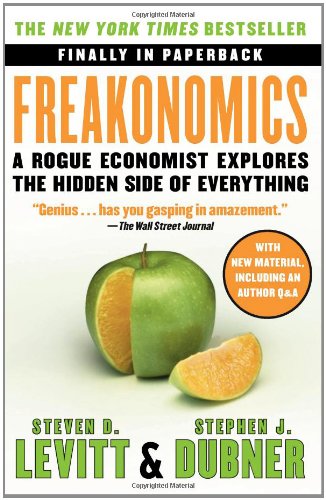All Nonfiction
- Bullying
- Books
- Academic
- Author Interviews
- Celebrity interviews
- College Articles
- College Essays
- Educator of the Year
- Heroes
- Interviews
- Memoir
- Personal Experience
- Sports
- Travel & Culture
All Opinions
- Bullying
- Current Events / Politics
- Discrimination
- Drugs / Alcohol / Smoking
- Entertainment / Celebrities
- Environment
- Love / Relationships
- Movies / Music / TV
- Pop Culture / Trends
- School / College
- Social Issues / Civics
- Spirituality / Religion
- Sports / Hobbies
All Hot Topics
- Bullying
- Community Service
- Environment
- Health
- Letters to the Editor
- Pride & Prejudice
- What Matters
- Back
Summer Guide
- Program Links
- Program Reviews
- Back
College Guide
- College Links
- College Reviews
- College Essays
- College Articles
- Back
Freakonomics by Steven Levitt and Stephen Dubner
The World According to Incentive: A Book Review of Freakonomics
From the desk of an award winning professor and a former New York Times author comes Freakonomics, Steven Levitt and Stephen Dubner’s book of jaw-dropping truth about the things in life you don’t think twice about. According to them, finding truth in our world is as simple as asking the right questions. Some of the questions they discuss are: Should we worry about our children playing with guns or focus our attention on their swimming in swimming pools? What happened to the exponentially increasing rate of criminals in the 90s? Does good parenting matter? And why do drug dealers live with their moms? One may believe that the questions asked in Freakonomics can be answered with conventional wisdom. These authors prove otherwise.
The authors’ writing style is so moving and persuasive that I had to believe their theories; I couldn’t disagree with their logic after they so smoothly guided me through it. For example, according to Freakonomics, Roe V. Wade had a major influence on crime rates in New York City about 20 years afterward. Dubner and Levitt claim that girls from unfortunate places, like ghettos and poor communities, are most likely to birth future criminals. After the abortion case, these girls were able to get abortions, no longer birthing these criminals. The way the authors guide the reader backward, step-by-step from current New York City crime to the abortion case made me unable to question whether the case affected crime rates, they made me sure it did. The logic of the text amazed me. I can’t imagine how the authors found these things out, or how they knew to ask the perfect questions they did.
However, in hindsight, I did wonder about the holes in their facts. For example, I think the abortion-crime theory would be better proved with statistics showing how many criminals are raised in the ghetto. That would prove that abortion could eliminate criminals in these communities, because we would know the criminals would have existed if not for abortion. All in all, Freakonomics changed the way I look at the world, I always find myself thinking about how things happened, their far-off effects.
As moved and turned upside down as I was, I was still somehow bored while reading it. Each individual fact was very interesting, but soon it became fact, after fact, after fact. That said, the facts are crazy and interesting, therefore I am glad I read the book, and I think anyone else would be too. Also, I didn’t like how the overarching theme of the book was established in the introduction; leaving no suspense. People respond to incentive, I got the point very quickly. The book was example after example of surprising and unsurprising responses to incentives. It got old. I think it would have been much better if Dubner and Levitt had other points to prove. Overall, I do not regret reading Freakonomics, but it wasn’t a “can’t-put-it-down” kind of book.
Similar Articles
JOIN THE DISCUSSION
This article has 1 comment.

